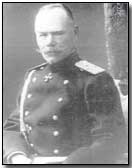Who's Who - Mikhail Alexeev
 General Mikhail Alexeev
(1857-1918) served as Commander-in-Chief of the Russian army for two months
during World War One.
General Mikhail Alexeev
(1857-1918) served as Commander-in-Chief of the Russian army for two months
during World War One.
Born on 15 November 1857 in Tver the son of a private soldier Alexeev entered the army in 1876, graduating from Staff College in 1890. He progressed through the army until, in 1904, he was finally promoted General.
With the declaration of war in August 1914 Alexeev was appointed Chief of Staff to the Russian southwestern army group in Galicia, working alongside Ivanov.
The following March Alexeev was given command of the northwestern army group. In spite of his former working relationship with Ivanov he nevertheless declined to despatch forces to reinforce Ivanov's offensive in the Carpathians; he also held back the provision of reserves intended to meet the Gorlice-Tarnow Offensive.
Fortunately Alexeev managed to avoid any share of the blame once news of Ivanov's difficulties reached Stavka. Instead he was appointed Chief of Staff at Stavka with the Tsar's decision to take personal command of the army in September 1915.
Eminently more suited to his role than his incompetent predecessor Yanushkevich, Alexeev - effectively Commander-in-Chief despite the Tsar's nominal command - worked with a degree of success to establish a form of central control over military operations in the Eastern Front, in spite of an appalling communication system and a skeleton staff.
Alexeev was also responsible for planning the Galician campaign that almost succeeded in knocking Austria-Hungary out of the war. However his contribution to the successful Brusilov Offensive was generally passive, although he was able to share in at least some of the credit along with Alexei Brusilov.
Reluctant to send reinforcements to Romania (whose entry into the war as an ally was widely considered a nuisance by the Russians), he only did so once it became apparent that Russia's own borders were at risk.
Alexeev suffered a heart attack in November 1916, forcing him to enter temporary retirement. Returning to his command just in time for the February Revolution of 1917 Alexeev oversaw Nicholas II's reluctant decision to abdicate. In the Tsar's stead he acted as Commander-in-Chief for two months before his opposition to the Kerenski Offensive brought his effective dismissal in May.
Recalled to his post in September 1917 he promptly resigned twelve days later, again in protest at policy.
Alexeev was a notable figure in the anti-Bolshevik White movement until his death from a heart attack on 8 October 1917 at the age of 60.
The "linseed lancers" was the Anzac nickname assigned to members of the Australian Field Ambulance.
- Did you know?
